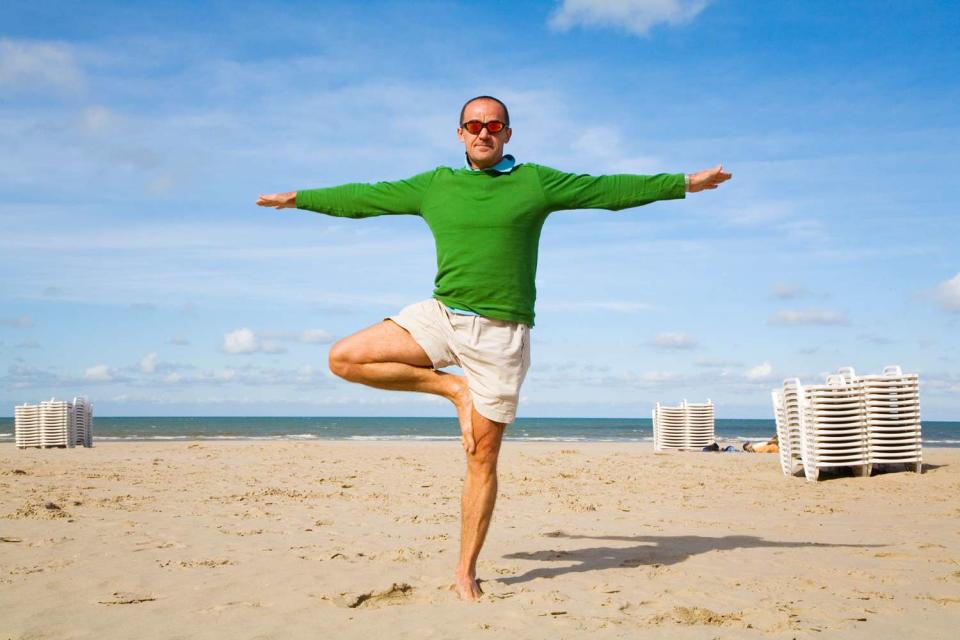“If you have poor balance, you’re at risk of falling, whether or not you’re moving,” a senior author of a new Mayo Clinic study said
Stock photo of a man standing on one leg” src=”https://s.yimg.com/ny/api/res/1.2/kWYjqIe7Tv4cHYNzVCkV6A–/YXBwaWQ9aGlnaGxhbmRlcjt3PTk2MDtoPTY0MA–/https://media.zenfs.com/en/people_218/39ce154b1d6930298bbafe5e65417c40″ class=”caas-img”>
Getty
Stock photo of a man standing on one leg
Standing on one leg could tell people a bit about their overall health — and apparently, their age — according to new research from Mayo Clinic.
A new study published on Wednesday, Oct. 23 in the journal PLOS One found that how long someone can stand with only one leg on the ground is a better measure of aging than changes in strength or gait (one’s walking pattern).
In the study, 40 healthy adults over the age of 50 — half of which were over the age of 65 — participated in walking, balance, grip strength and knee strength tests.
For their balance tests, they were tasked with keeping steady under varying circumstances as they stood on force plates: on two feet with their eyes open and then closed, and then on their non-dominant and also their dominant leg each with their eyes open.
As the researchers discovered, per the Mayo Clinic, how long someone maintained their balance while standing on the non-dominant leg showed “the highest rate of decline with age.”
Stock photo of a woman standing on one leg” src=”https://s.yimg.com/ny/api/res/1.2/cPehAqUaWJ7FKfWcihlmFg–/YXBwaWQ9aGlnaGxhbmRlcjt3PTY0MDtoPTk1MQ–/https://media.zenfs.com/en/people_218/bd1c1bcc9024f33430b9a1f185376033″ class=”caas-img”>
Getty
Stock photo of a woman standing on one leg
Related: New Study Finds Physical Fitness Can Improve Mental Health in Children and Young Adults
The research found that the duration one can stand on a single leg declined at the rate of 2.2 seconds per decade in the non-dominant leg, while doing the same at the rate of 1.7 seconds per decade in the dominant leg. This was true for both men and women, the study noted.
Senior author Kenton Kaufman said in a statement shared by Mayo Clinic that balance is an “important measure” given it takes account for muscle strength and also “requires input from vision, the vestibular system and the somatosensory systems.”
“Changes in balance are noteworthy,” he said. “If you have poor balance, you’re at risk of falling, whether or not you’re moving. Falls are a severe health risk with serious consequences.”
According to the National Institute on Aging, falling is the leading cause of injury in older adults, as one in four people over the age of 65 fall each year. The Centers for Disease Control and Prevention (CDC) notes that roughly 3 million older adults visit the emergency room annually due to falls, with 1 million hospitalized.
Never miss a story — sign up for PEOPLE’s free daily newsletter to stay up-to-date on the best of what PEOPLE has to offer, from celebrity news to compelling human interest stories.
Speaking with CNN, Kaufman said that good balance “provides the ability to carry out activities” of day-to-day life, “without the fear of falling.” This, he said, “leads to improved quality of life and healthy aging.”
As noted by AARP, a previous study led by Duke Health researchers found that adults in their 30s and 40s could balance on one leg for about a minute, those in their 50s could for 45 seconds and adults in their 70s could do so for 26 seconds. As Kaufman told the outlet, those over the age of 65 who can balance on one leg for 30 seconds would be “doing quite well,” and that a cause for concern is “if you can’t balance for five seconds.”
He added that he stands on one leg at least once a week — a process which others can do to train themselves to maintain correct balance. “A little practice won’t hurt either,” he told AARP. “It’s easy to do. It doesn’t require special equipment, and you can do it every day.”
Speaking with CNN, Dr. Anat Lubetzky who was not involved in the study said that balancing on one leg alone can’t “solve all balance problems and fall risk,” and that “all aspects of balance — static, dynamic and overall strength” should be considered.
For more People news, make sure to sign up for our newsletter!
Read the original article on People.
EMEA Tribune is not involved in this news article, it is taken from our partners and or from the News Agencies. Copyright and Credit go to the News Agencies, email news@emeatribune.com Follow our WhatsApp verified Channel




